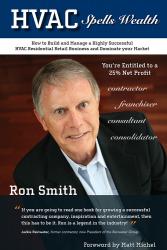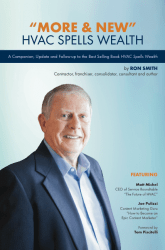Meet Ron Smith
Wealth Book Legend-Crusader is a term many use in describing Ron Smith. Throughout his Wealth Book business career, starting in 1961, Ron has enjoyed starting new ventures, developing and applying new creative ideas, freely sharing information and introducing enthusiastic and bright people to the industry. Many of his operational systems and processes, and marketing and sales programs are in wide use throughout the United States, Canada, and many other foreign countries.

Products
Find Ron’s Best Selling Books and other Success Building Products by Ron Smith, Tom Piscitelli, Charlie Greer, Matt Michel, Brandon Jacob, Mark Matteson and others.

HVAC Spells Wealth: Book
Are you interested in selling your company?
“This is the ultimate how-to manual for a service company. Ron breaks business down to its essence: getting customers and keeping them. He shares the techniques that he developed in the process of transforming his first and small company into a huge one. He’s proven the approach is transferable and has literally trained thousands of contractors helping them grow revenues while significantly improving profits. Don’t wait, buy this book, read and re-read it. Dominate your market.”
Matt Michel
CEO and President of The Service Roundtable
“An outstanding leadership manual for any contractor who wants to build a successful residential retail business. Ron broke the code on how to achieve success in this business a number of years ago and has shared his business acumen through consulting, teaching and hundreds of magazine articles. With this new book, Ron Smith puts it all together in an easy to use and easy to understand comprehensive guide to success and profitability.”
Jim McDermott
Vice President and Editorial Director of HVACR Business, Former Publisher of Contracting Business, Contractor and HVAC Engineering
